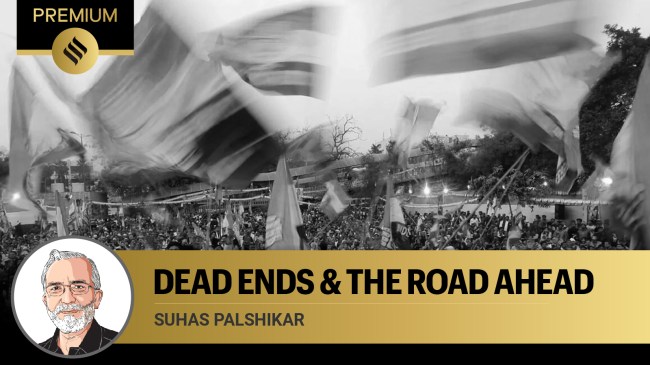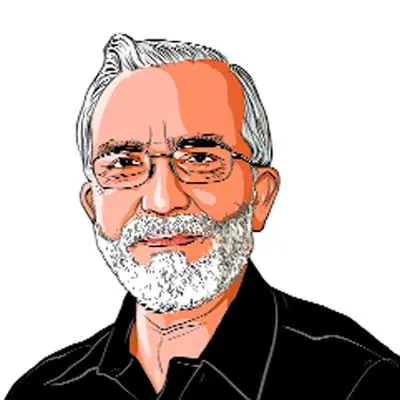Opinion 3 reasons why Congress can’t rediscover itself
Even after 10 years of being out of power, Congress has neither attempted to build an organisation nor evolved a cogent ideological position
 Do they constitute the bulwark against the politics of hate and exclusion or do they remain silent or absent spectators when hate or social exclusion runs amok?
Do they constitute the bulwark against the politics of hate and exclusion or do they remain silent or absent spectators when hate or social exclusion runs amok? Ever since it lost to the simultaneous emergence of Hindutva and Mandal forces in the late 1980s, Congress has been at a crossroads. This resulted in the party helplessly witnessing the vandalisation of not just a mosque but of the Constitution’s core values. It forced the party to counterbalance the Mandal phenomenon by talking about reservation for the “poor”.
Today, Congress seems to be moving away from that legacy and seeking to rediscover itself. It hopes the road to justice will convince Muslims that Congress offers them respect and material well-being and that this same road will enable it to mobilise the backward and the poor as one bloc. On paper, this new approach seems attractive and potent. After all, India needs a new social contract that is different from the immediate post-Independence utopia of development and distinct from the current dystopia of Hindu India. But can Congress shape this new social contract as a political imagination? Its trouble is that it has taken too long to even begin formulating a new ideological position. Two decades ago, unease about older positions as also about bland hopes of a turnaround due to new economic policies pushed the party’s intellectuals to search for new formulations. When it regained power for a decade (2004-14), the party neither attempted to build an organisation nor evolved any cogent ideological position. Once thrown out of power, it had all the time in the world to engage in both, but still failed to do either.
For Congress, things happen in bits and pieces — some electoral victories, some popular mobilisation, some new promises — but there is no concerted roadmap even after 10 years of being out of power. To be fair, it is not easy to build a party organisation and an ideological position when the ruling party is not only a dominant force but an aspiring hegemon. Besides, Congress’s failure is, in part, due to its style of building a consensus among its major stakeholders. This is partially due to the absence of a strong leader whom both internal power centres and ordinary workers would recognise as a binding force.
But over and above these limitations, Congress — and any Opposition political force — faces three critical issues that hurt the process of ideological rediscovery.
One, as Congress realised during the decade of UPA rule, having opened the doors for the free play of corporate interests as a pathway to growth, it is not easy to rein in the corporates. It is now tough to acquire the intelligentsia’s approval for any measure of redistribution of resources. And the collective will of society, particularly its middle-to-lower-middle strata, to seek such redistribution has become weak in the wake of dreams sold by the new global economic order. Congress’s nyay path hits a roadblock because there is a lack of social approval and an absence of enthusiasm among its own leaders on democratically balancing corporate interests and the urgency of redistribution.
Two, with the vicious normative assault Hindutva forces have waged in the past 10 years, the war between the politics of pseudo-cultural assertion and a culture of inclusion has become extremely one-sided. This does not have implications only for the question of minority rights and the existential challenge faced by Muslims; it also punctures the possibility of a social rapprochement between India’s lower and upper strata. The politics of social justice that Congress talks of hits a dead end in its confrontation with Hindutva. The space for ideological claims on behalf of inclusion is shrinking — the backward castes do not necessarily see their alignment with Hindutva as an impediment to upliftment. Changing this is a long-term task and Congress will have to find ways of talking to the masses where material adversities will trump the attractions of false cultural assertions.
Three, the state apparatus today has become an instrument of citizen suppression. In the name of strong state machinery, governance has sacrificed all pretence of upholding the liberal norms enshrined in the Constitution. Once terrorism became a part of global discourse, every disliked social force came to be equated with anti-state conspiracy — something in which the earlier Congress, too, has been complicit. Besides and along with Hindutva, this attraction for a strong state apparatus has effectively dumped the authenticity of democracy as a criterion of acceptable politics. Politics and society are only too eager to settle for a minimal democratic pretension and there has been no judicial pushback; rather, there has been support for this idea of state power.
It is not sufficient, therefore, that Rahul Gandhi — or someone else — speaks of nyay, redistribution, inclusion and a democratic state. For a party to formulate and popularise its ideological position, its influential leaders must arrive at a consensus about the normative value of these ideas. They may differ on details, means and even on programmes to be adopted. But the crucial question for Congress is: Does its leadership subscribe to these normative values? Moving further, do Congress governments in states pass muster on these critical counts — reining in corporate power to create space for redistribution, consolidating social sections in a way that will ensure a confrontation with pseudo-cultural claims and exercising state power within a strictly liberal framework? Most critically, what do Congress workers do locally? Do they constitute the bulwark against the politics of hate and exclusion or do they remain silent or absent spectators when hate or social exclusion runs amok?
Then there is a curious phenomenon: While in Opposition, Congress remains defunct and while in power, it behaves in many respects like any other party — even its arch-rival. As a ruling party, it has to ensure that its performance and image will be distinct and in tune with its political imagination. As an Opposition, the Congress needs to situate itself among the masses rather than merely among discussion fora and social-media posts. After the Bharat Jodo Yatra, the party did not give any concrete programme to its workers, and even almost a year after the last election, it is yet to behave as an Opposition outside Parliament.
If Congress doesn’t want to be at the crossroads permanently, it will have to cross many of these bridges.
The writer, based in Pune, taught Political Science






